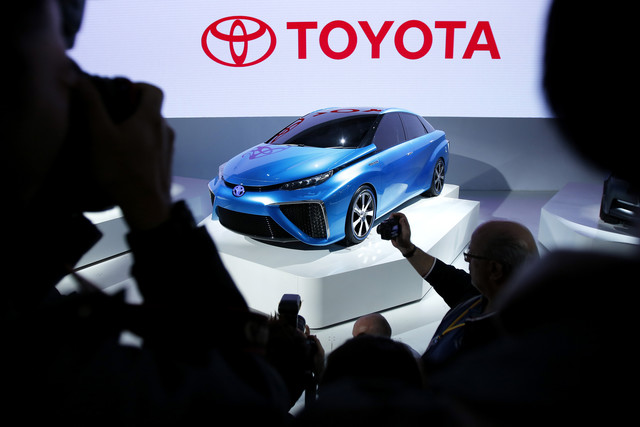Toyota Motor Corp., which is getting ready to sell Camry-sized sedans powered by fuel cells next year in the U.S., plans to help create a network of hydrogen stations that may include pumps at car dealers and even trash dumps.
The world’s largest automaker showed its hydrogen-fueled FCV sedan, a concept version of the car Toyota will sell in the U.S. and Japan next year, at the International Consumer Electronics Show in Las Vegas yesterday. Along with cutting costs to make the vehicles, Toyota will do “whatever we can” to get more fuel stations set up, Bob Carter, Toyota’s U.S. group vice president, said in an interview.
“We’re throwing everything against the wall,” Carter said yesterday in Las Vegas. “We know we have to push the infrastructure.”
Toyota, Hyundai Motor Co. (005380) and Honda Motor Co. have announced plans to sell hydrogen cars and crossovers initially to drivers in California, where strict state rules require increasing numbers of “zero-emission” vehicles to be sold each year through 2025. Currently, the state has about 10 public hydrogen fuel pumps, though the number is set to rise from this year, with a target of 100 more within a decade.
California committed last year to spending as much as $200 million to expand its fueling network by 2024. Toyota is working with the University of California at Irvine and state officials to identify ideal locations for future fuel pumps. Only 68 stations are needed to ensure most California drivers have a place to refuel, Carter said.
Landfills, Dumps
Toyota has risen 50 percent in Tokyo trading in the past 12 months. The shares fell 0.2 percent to 6,290 as of 10:55 a.m., while Japan’s benchmark Nikkei 225 Stock Average dropped 0.4 percent.
While hydrogen for fuel and industrial uses is produced mainly by steaming it out of natural gas, Toyota is exploring alternative sources including methane emitted from waste-treatment plants, trash dumps and landfills and agricultural sources, Craig Scott, the carmaker’s U.S. national manager for advanced technologies, said in an interview in Las Vegas.
The Toyota (7203) City, Japan-based carmaker is exploring how to work with other companies to set up pumps dispensing hydrogen from such sources, Scott said, without elaborating.
Some Toyota dealers in California may also install hydrogen pumps, Carter said.
Concrete steps by Toyota to set up stations will come within a few months, Carter said. “We’re going to do what we can to help kick-start the construction of convenient hydrogen refueling infrastructure.”
More Cars
Fuel-cell autos are similar to battery-only models such as Nissan Motor Co. (7201)’s Leaf hatchback and Tesla Motors Inc.’s Model S sedan in avoiding tailpipe pollution from burning gasoline.
Battery models carry electricity in their lithium-ion battery packs while fuel-cell vehicles make electricity on board in a chemical reaction between hydrogen and oxygen, with only water vapor as a byproduct. While hydrogen vehicles have a range comparable to gasoline vehicles and need only a few minutes to refuel -- compared with hours for most battery autos -- there are few hydrogen pumps currently open to the public.
Hydrogen critics include Tesla Chief Executive Officer Elon Musk, who has derided the technology as too costly and complex to succeed in the consumer market.
Bigger Supply
Carter said yesterday that Toyota will supply a bigger number of fuel-cell sedans than initially planned, without providing either the previous or revised volume goal.
The company also hasn’t yet set a precise on-sale date or price for the car. Toyota engineers previously said it might be priced around $50,000 and will have driving range of at least 300 miles (483 kilometers) per fueling.
The concept car shown in Las Vegas produces enough energy to power a home for a week, Carter said. Toyota engineers are developing a device that connects to the car and would allow it to act as a backup generator, he said.
“Fuel-cell electric vehicles will be in our future sooner than many people believe, and in much greater numbers than anyone expected,” Carter said.
Toyota’s U.S. sales unit is based in Torrance, California.
To contact the reporter on this story: Alan Ohnsman in Los Angeles at aohnsman@bloomberg.net
To contact the editor responsible for this story: Jamie Butters at jbutters@bloomberg.net
©2014 Bloomberg L.P. All Rights Reserved. Made in NYC
